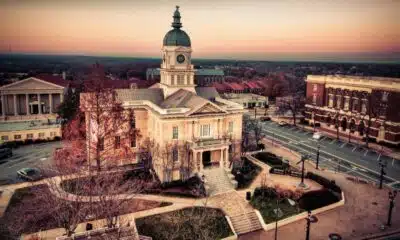News from the South - Alabama News Feed
How could a proposed hyperscale data center affect Bessemer?
by Lee Hedgepeth, Inside Climate News and Lanier Isom, Alabama Reflector
July 27, 2025
This article originally appeared on Inside Climate News, a nonprofit, non-partisan news organization that covers climate, energy and the environment. Sign up for their newsletter here.
BESSEMER — For Ron Morgan, the signs told the tale. He was among the dozens of residents who spilled into the Birmingham suburb’s city hall chambers who were met by what they viewed as propaganda: Literal signs, the residents felt, that city officials may not have an open mind about voting against a development project facing near universal public opposition.
Flanking the chamber doors and on both sides of the council dais were city-printed posters with bold, all-capital letters at their tops: “LET’S TALK FACTS.”
Lower down on the posters was information residents said they felt was misleading and aimed at swaying public opinion on an issue they’ve studied closely: the impacts of a 4.5 million square foot data center proposed in their largely rural community.
GET THE MORNING HEADLINES.
“Focus on Benefits,” one of the posters read, “Not Misinformation.”
At the bottom of the posters, next to an emblem of city hall itself, another all-caps slogan: “POWERED BY KNOWLEDGE, NOT FEAR.”
“They’ve already made their mind up,” Morgan, an Army veteran, said. “No surprise there.”
So far, officials in the city of 25,000 have shown little interest in publicly digging into the details of what could be one of the largest development projects in state history—one that would require the clear-cutting of more than 100 acres of land, threaten endangered species and lead to large increases in water and electricity usage.
Instead, public officials, many bound by non-disclosure agreements with the developer, have relied on the assertions of the company proposing the project—a company that has so far refused to answer media questions about the impact of their plans on the community and the environment.
Not long after the July 15 City Council meeting began, Brad Kaaber, a representative of the developer, Logistic Land Investments LLC, told City Council members that residents’ near-universal opposition wasn’t based on facts.
“You’re going to hear things that simply are not true,” Kaaber told council members. “And I appreciate all the people who took time out of their day to come to a meeting like this, but all I want to do is speak to the facts. You’re going to hear a lot of things that simply are not facts.”
Residents who’d packed into the relatively small council chambers balked, audibly reacting to Kaaber’s comments.
Earlier, when Martin Evans, the developer’s attorney, exceeded the two-minute time limit imposed by the council on comments, several members of the audience shouted in protest. Proponents of the development, they said, should be bound by the same time constraint placed on opponents. Council President Donna Thigpen quickly squelched the residents’ complaints: “If you can’t be quiet, we’ll clear the room,” she said.
As Kaaber continued speaking, JC Matthews, director of economic development for the Birmingham Business Alliance, reacted to the groans of community members.
“Y’all just don’t care about the facts,” he said from the side of the room. Residents seated nearby, dressed in red to show their opposition to the data center’s construction, looked shocked.
“That’s exactly what we’re interested in,” one resident said. “The facts.”
To find “the facts,” Inside Climate News interviewed the developer’s representative, public officials and residents who live near the proposed development site on key topics and claims. Among the findings:
Water usage
Because of the need to cool the computer servers and other electronics in the proposed data center, the facility—consisting of 18 buildings, each the size of a Walmart Supercenter—could consume large amounts of water. The specific amount of water used by a data center campus depends primarily on its size and on its specific method of cooling.
Representatives of the developer behind the Bessemer project have said they’re unsure which method of cooling will ultimately be used by the proposed data center campus because an end user has not yet been secured.
At a June meeting, Kaaber told planning and zoning commissioners that a large tech firm, likely a Fortune 10 company, would eventually sign on as the facility’s primary customer—Google, Microsoft, Amazon and Facebook among the chief possibilities.
Only then, with a final user in place, would there be firm estimates of water usage.
Still, publicly available documents provide an insight into how much water the project could ultimately consume.
Warrior River Water Authority, a local utility, said in a letter obtained by Inside Climate News that the developer requested a supply of 2 million gallons per day, an amount the utility said it would not be able to provide without “significant upgrades” to the water distribution system.
Water usage of 2 million gallons per day would likely place the facility among the largest consumers of water in the region with the exception of power plants, the utility document said, straining its capacity. Residents have said they already consider the water utility unreliable.
Publicly available information suggests that the Warrior River Water Authority’s supply capacity is around 6 million gallons per day. Usage of 2 million gallons per day, then, would amount to a third of the utility’s water supply if capacity is not increased to accommodate the facility.
The 2 million gallons of water a day requested by the developer is equivalent to the typical usage of around 6,700 households, about two-thirds of Bessemer’s population, based on the water utility’s consumption estimates.
Charles Miller, policy director for the Alabama Rivers Alliance, told council members at the July 15 meeting to be wary of the developers’ claims that council members should leave environmental regulation to other entities, like the Alabama Department of Environmental Management or the federal Environmental Protection Agency.
“In Alabama, we have no water quantity laws, so no state body or board will be examining whether the volume of water this project requires is reasonable or will harm neighboring communities,” Miller said.
“Water is a finite resource,” Lauren Adele, a citizen concerned about rising water utility rates, told council members. “What do we do as the residents of Bessemer, Jefferson County, Birmingham, the state of Alabama, when our showers don’t work, when we have no water pressure, when we can’t wash our dishes, when we can’t cook our food? We have no way to generate more water than what God sends us from the sky.”
Public water usage estimates also don’t account for the additional water Alabama Power will need to cool its power plants as they provide megawatts of new power the proposed data center in Bessemer will need to operate.
Power consumption
In addition to significant water usage, the data center in Bessemer will consume an enormous amount of electricity, with servers running around the clock.
A document produced by Evans & Evans, the law firm representing the developer, suggests that at total buildout, the proposed data center campus would consume around 1,200 megawatts of energy. That’s more than 90 times the amount of energy used by all residences in Bessemer and more than 10 times the amount of energy used by all residences in Birmingham annually. An increase of that magnitude would amount to a 10 percent rise in Alabama Power’s total electricity demand statewide.
Increased demand for energy, or at least the potential for it, is already driving Alabama Power’s desire to double down on fossil fuel investments. The company, an effective monopoly, has asked the state’s Public Service Commission to approve its purchase of a gas-powered power plant in recent days, increasing the state’s reliance on fossil fuel energy, which globally accounts for over 75 percent of greenhouse gas emissions.
Many experts also say that increased demand from data centers across the country will drive prices up for everyone, including residential customers. Alabamians already pay some of the highest energy bills in the country, according to various analyses of electricity rates nationwide.
Ron Morgan expressed his concern to council members that the data center’s power usage will be so large that it will have to take electricity from multiple power plants.
“Just because they’re on a transmission line doesn’t mean that Alabama Power can flip a switch and provide an additional 1,200 megawatts of power,” he said.
Cancer risks
The city’s signs at July’s council meeting made specific claims around the risk of cancer caused by data centers.
“MYTH: ‘Data Centers Cause Cancer’ FACT: There is NO scientific proof linking data centers to cancer,” the sign said. “While data centers do use diesel backup generators, these are rarely used and must meet EPA emission standards. Most centers are also moving toward clean energy and battery backups.”
No one involved in the proposed development has suggested that either renewable energy or battery backups will be used at the data center, if built. Instead, Kaaber confirmed at the meeting that diesel generators will be the backup source of energy at the site. Kaaber said that each generator in the “generator yards” would be tested three hours each month.
Estimates based on other hyperscale data centers suggest that the proposed Bessemer data center campus would need between 300 and 500 diesel generators to provide a reliable backup source of electricity for the facility. Amazon representatives in Minnesota, for example, asked regulators to approve the operation of 250 diesel generators to provide back power for a facility around half the size of that proposed in Bessemer. Regulators rejected the plan. Even assuming uninterrupted power supply, the testing of the generators for three hours per day would produce a significant amount of emission, contributing to air pollution.
Exposure to diesel exhaust can lead to “serious health conditions,” according to the EPA. Diesel fumes are “likely to be carcinogenic to humans,” according to the federal agency.
The International Agency for Research on Cancer also labels diesel exhaust as “carcinogenic to humans.”
Becky Morgan, who already suffers from breathing issues, told council members about her concerns around air pollution caused by diesel generators. She said the council’s posters claiming data centers don’t cause cancer are inaccurate. She said that even if the facility’s power supply is stable, the particulate matter from testing the generators will travel great distances. EPA regulates such emissions, she said, precisely because they may cause cancer.
“We need to know how many generators are going to be backing up the 1,200 megawatts, because that’s a huge factor,” she said. “Pollution will travel. It’s going to come in our backyards.”
Endangered species
Kaaber, the representative for the developer, has told residents in Bessemer that there will be no notable environmental impact from the proposed data center site.
Multiple experts interviewed by Inside Climate News have said the project will have significant, potentially irreversible impacts, including putting an already imperilled, newly identified species of fish—the Birmingham darter—at risk of extinction.
“This would nuke this creek,” Thomas Near, a Yale biologist, said of the data center project.
Near said that based on what he’s learned, its construction and use would be devastating for the Birmingham darter and for other aquatic wildlife in the area.
These “dramatic” negative impacts, he said, could include increased river temperature for a fish attuned to inhabit cool, spring-fed streams. Significant water runoff and water extraction for cooling purposes would also fundamentally alter the ecosystem. And Near is concerned about how the data center development might affect the delicate limestone substrate habitat unique to the Birmingham darter.
The Center for Biological Diversity, a national environmental nonprofit, has also said they’re considering legal action against the city under the Endangered Species Act related to the project’s potential impacts on the watercress darter, another fish already listed as endangered under federal law.
In his comments on environmental impacts, Kaaber has referenced multiple environmental assessments he said were conducted by the developer but has so far declined a request from Inside Climate News for those assessments. Kaaber would not answer questions about the project following the July meeting.
Zoning changes
In a June zoning and planning commission meeting, representatives of the developer suggested that hyperscale data centers are commonly zoned as “light industrial,” the zoning classification they’ve advocated for in the context of the current proposal.
Under Bessemer’s zoning regulations, light industrial uses include bus terminals, gas stations with garages and large billboards. Expressly forbidden from light industrial classification are facilities “which are especially detrimental to property or to the health and safety beyond the district by reason of the emission of odor, dust, gas, fumes, smoke, noise, vibration or waste material.”
The proposed data center site is currently zoned for agricultural use, but city officials are concurrently considering changing the site’s zoning to light industrial to facilitate the construction of the new development.
“This is not light industrial,” Becky Morgan told zoning commission members. The facility’s high power consumption, security needs and sheer footprint should require its zoning in heavy industrial or another, newly created zoning category, she argued.
An Inside Climate News analysis of zoning ordinances around the country concluded that hyperscale data centers are rarely zoned “light industrial.” Municipalities more commonly create a new zoning category specific to data centers, which have unique power and water usage needs when compared to many other commercial facilities.
Many cities also require the placement of such facilities in areas zoned for heavy industrial use. For example, the only other data center project backed by Logistic Land Investment—a proposed data center in Texas—has been zoned heavy industrial.
Tax implications
Both the residents and the developer have made various claims around the tax implications of the project. Representatives of the developer have suggested that the project will be a financial boon for the city while residents have said they’re skeptical of the claims.
Jimmie Stephens, president of the Jefferson County Commission, told council members at the meeting that they would likely end up abating more tax revenue than they would actually collect.
“This isn’t about the environment,” Stephens said. “This is about the money. This is about the tax revenue that has been laid before the city of Bessemer that you’re depending on, you’re looking forward to but that, in all likelihood, they’re going to ask you to abate.”
Stephens, who is opposed to the project, said that if any abatements go before the Jefferson County Commission, he would vote against them.
He may not have the chance. Alabama law contains explicit tax carve outs for capital projects, including a specific, 30-year tax abatement meant to attract large data centers. If approved by Bessemer officials, a tax abatement under the economic development law could amount to a tax cut of more than $500 million. It’s unlikely such an abatement would even need to go before the county commission.
Rep. Leigh Hulsey, a member of the Alabama House who represents residents in the area, said she’s also skeptical of claims around tax revenues. She said she’s spoken to individuals familiar with a data center project in Huntsville who confirmed that actual tax revenues are not meeting expectations.
“They’re not bringing the revenue that the city thought they would, and that’s the truth,” Hulsey said. “That’s directly from those individuals there in Huntsville. It’s the same thing that Commissioner Stevens was talking about. There are promises. … It’s not going to bring all the money you think it’s going to bring.”
The Bessemer City Council is scheduled to consider approval of zoning changes and the related preliminary development plan on August 5.
Independent Journalism for All
As a nonprofit newsroom, our articles are free for everyone to access. Readers like you make that possible. Can you help sustain our watchdog reporting today?
Alabama Reflector is part of States Newsroom, a nonprofit news network supported by grants and a coalition of donors as a 501c(3) public charity. Alabama Reflector maintains editorial independence. Contact Editor Brian Lyman for questions: info@alabamareflector.com.
The post How could a proposed hyperscale data center affect Bessemer? appeared first on alabamareflector.com
Note: The following A.I. based commentary is not part of the original article, reproduced above, but is offered in the hopes that it will promote greater media literacy and critical thinking, by making any potential bias more visible to the reader –Staff Editor.
Political Bias Rating: Center-Left
This article leans center-left by emphasizing environmental concerns, community opposition, and skepticism toward corporate and governmental assurances about the proposed data center in Bessemer. The reporting highlights potential negative impacts such as water and power consumption, endangered species risk, and air pollution, giving voice to local residents and environmental experts while critically framing the developer’s claims and city officials’ limited transparency. Although it presents facts and includes perspectives from the developer and officials, the tone and selection of issues suggest a cautious stance aligned with environmental advocacy and community interests, characteristic of center-left coverage.
News from the South - Alabama News Feed
News 5 NOW at 8:00am | September 11, 2025
SUMMARY: On September 11, 2025, News 5 NOW covered 9/11 commemorations, including first responders climbing 2,000 steps at Hancock Whitney Stadium to honor the World Trade Center’s 110 stories. The Original Oyster House offered free meals to first responders in Mobile and Baldwin counties. The program also reported a new Vibrio bacterial infection case in Escambia County, highlighting health warnings for beachgoers. Additionally, they discussed a study linking chronic insomnia to increased dementia risk, election recounts in Gulf Shores, and a recent political shooting in Utah, sparking debate over harsher punishments for political violence. Viewer opinions on extraterrestrials and political violence were shared in an interactive social media segment.
First Responders in Mobile honored the heroes of September 11th, a Pensacola woman is in the hospital after being infected with the flesh eating bacteria vibrio vulnificus, and a vote re-count wrapped up in Gulf Shores…
News from the South - Alabama News Feed
Zaxby's Player of the Week: Dylan Jackson, Vigor WR
SUMMARY: Dylan Jackson, senior wide receiver for the Vigor Wolves, was named Zaxby’s Player of the Week after leading his team to a dominant region win with over 200 yards and two touchdowns. The Wolves, ranked number one in 5A, emphasize getting the ball to their best players, a strategy credited to Coach Mick S. Jackson’s ability to read defenses and execute plays with quarterback Sammy has been crucial. The team’s hard offseason training, especially in passing, is paying off. Their goals remain to beat Blunt, win the region, and compete for the state championship, treating each game like a playoff.
Zaxby’s Player of the Week: Dylan Jackson, Vigor WR
News from the South - Alabama News Feed
Alabama lawmaker revives bill to allow chaplains in public schools
by Andrea Tinker, Alabama Reflector
September 9, 2025
An Alabama representative is pushing for chaplains to be allowed in public school.
Rep. Mark Gidley, R-Hokes Bluff, prefiled HB 8 for the 2026 legislative session, which starts in January. It would allow school boards to decide whether to allow campus chaplains and teachers in public school.
Gidley has filed similar legislation in the past. The most recent version cleared the House with a vote of 91 to 4 in April but did not make it to the Senate Education Policy Committee. He said in an interview Monday that getting the bill in earlier will give it a better chance to pass.
“We were a little bit late getting it on the floor this past year. It didn’t fail in the Senate because of any problems, it just ran out of time. So I think getting it in earlier is going to help us to be able to work it through both chambers this year,” he said.
Gidley’s goal for the chaplains is that they go to the schools as needed to provide services and support for the faculty and staff in schools. He said this could help teachers in rural counties who lack resources for mental health services.
“It could be a resource they could tap into when they may not be able to tap into other resources that could offer support,” Gidley said.
Critics of the legislation said the measure would violate the separation of church and state in schools.
Each local board of education would vote on whether to approve volunteer chaplains for schools under the measure. If approved by the board, volunteers would have to complete a “recognized chaplain training program” and a background check.
The legislation specifies that schools cannot accept a volunteer who’s been “adjudicated or convicted of an offense that requires registration as a sex offender.”
Sen. Rodger Smitherman, D-Birmingham, backed a similar bill last year. SB294 was passed by the Senate, but it failed to get House approval.
He said in a phone interview Thursday that chaplains are needed in schools.
“We have many situations in our schools that require a need for counseling and for support — not only for students, but for staff and teachers as well,” he said.
Chaplains would provide “support, services and programs” as requested by teachers under the measure. But Smitherman said these types of motions are not meant to replace guidance counselors.
“Some of these situations need additional assistance in the areas that those chaplains can provide,” Smitherman said. “And the guidance counselor is not for the teachers and the staff workers, so this will make it available to them as well.”
Gidley said guidance counselors and chaplains serve different functions within the school.
“They’re not even in the same category and so it’s totally absurd to even think that one would replace the other,” he said. “These chaplains are strictly there for moral, and if need be, spiritual guidance. Whatever the situation is, if somebody needs a confidential nonpartisan place to share something they could be dealing with, I think that could be extremely helpful with our teachers and administrators in the school system.”
The Alabama Legislature will begin meeting Jan. 13.
Alabama Reflector is part of States Newsroom, a nonprofit news network supported by grants and a coalition of donors as a 501c(3) public charity. Alabama Reflector maintains editorial independence. Contact Editor Brian Lyman for questions: info@alabamareflector.com.
The post Alabama lawmaker revives bill to allow chaplains in public schools appeared first on alabamareflector.com
Note: The following A.I. based commentary is not part of the original article, reproduced above, but is offered in the hopes that it will promote greater media literacy and critical thinking, by making any potential bias more visible to the reader –Staff Editor.
Political Bias Rating: Center-Right
This content reflects a center-right political bias primarily through its focus on legislative efforts led by a Republican lawmaker advocating for chaplains in public schools, an initiative often associated with conservative values emphasizing religion in public life. The article presents the bill and its supporters in a factual and balanced manner, including some perspectives of critics concerned about church-state separation, which tempers any overt partisan slant. The respect shown for religious support roles aligned with traditional moral guidance aligns with center-right priorities, while the inclusion of bipartisan mentions adds a moderate tone overall.
-
News from the South - Louisiana News Feed6 days ago
Portion of Gentilly Ridge Apartments residents return home, others remain displaced
-
News from the South - North Carolina News Feed7 days ago
Hanig will vie for 1st Congressional District seat of Davis | North Carolina
-
News from the South - Alabama News Feed7 days ago
Alabama state employee insurance board to seek more funding, benefit changes
-
News from the South - West Virginia News Feed7 days ago
WV Supreme Court will hear BOE’s appeal in vaccine lawsuit — but not right away
-
News from the South - Virginia News Feed7 days ago
Norfolk port project funding to be withdrawn amid federal cuts to offshore wind projects
-
News from the South - Georgia News Feed7 days ago
More details expected on ICE raid at south Georgia plant | Georgia
-
Local News Video7 days ago
9/4 – Sam Lucey's “A Little More Humid” Thursday Night Forecast
-
News from the South - Missouri News Feed7 days ago
ICE arrests fell in August despite show of force in DC, Los Angeles












































